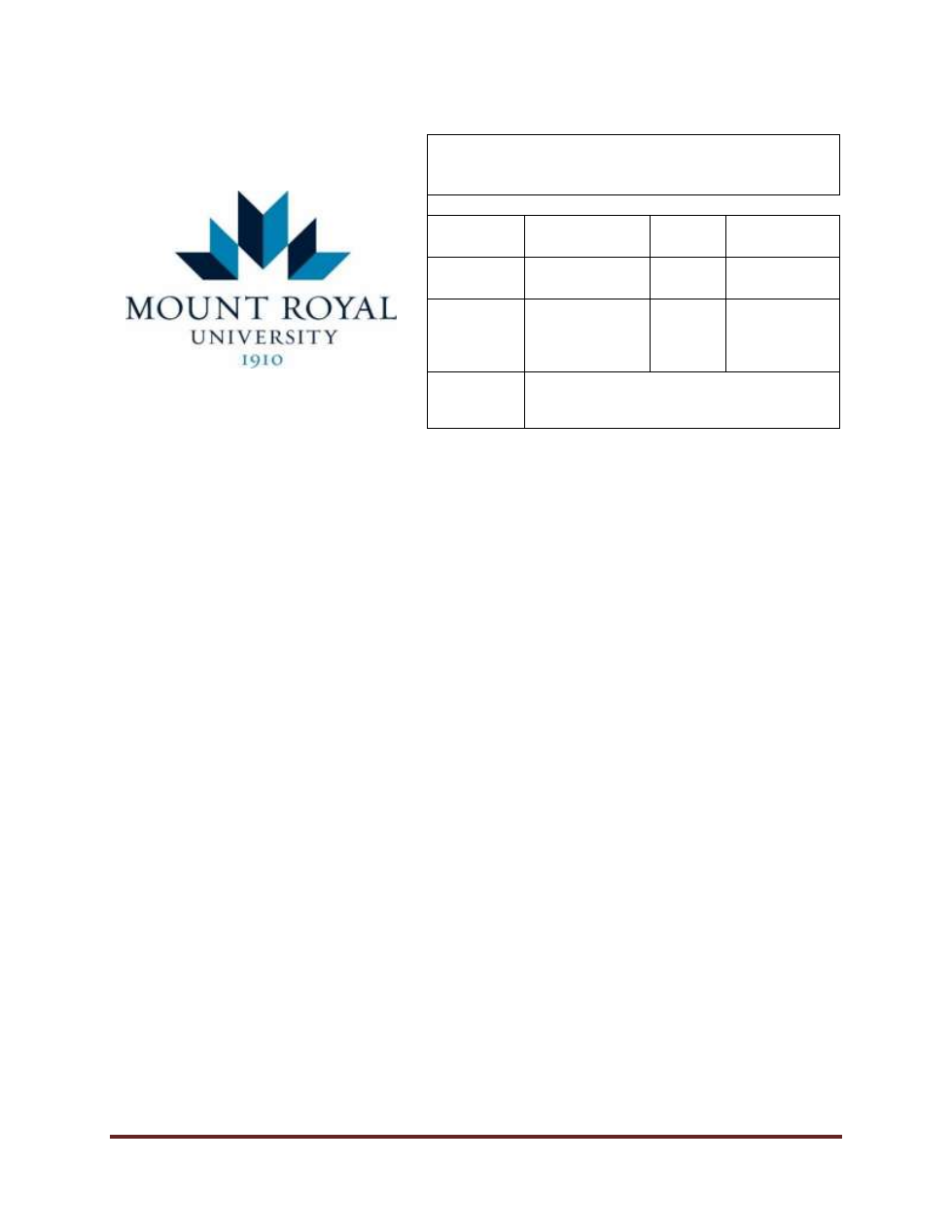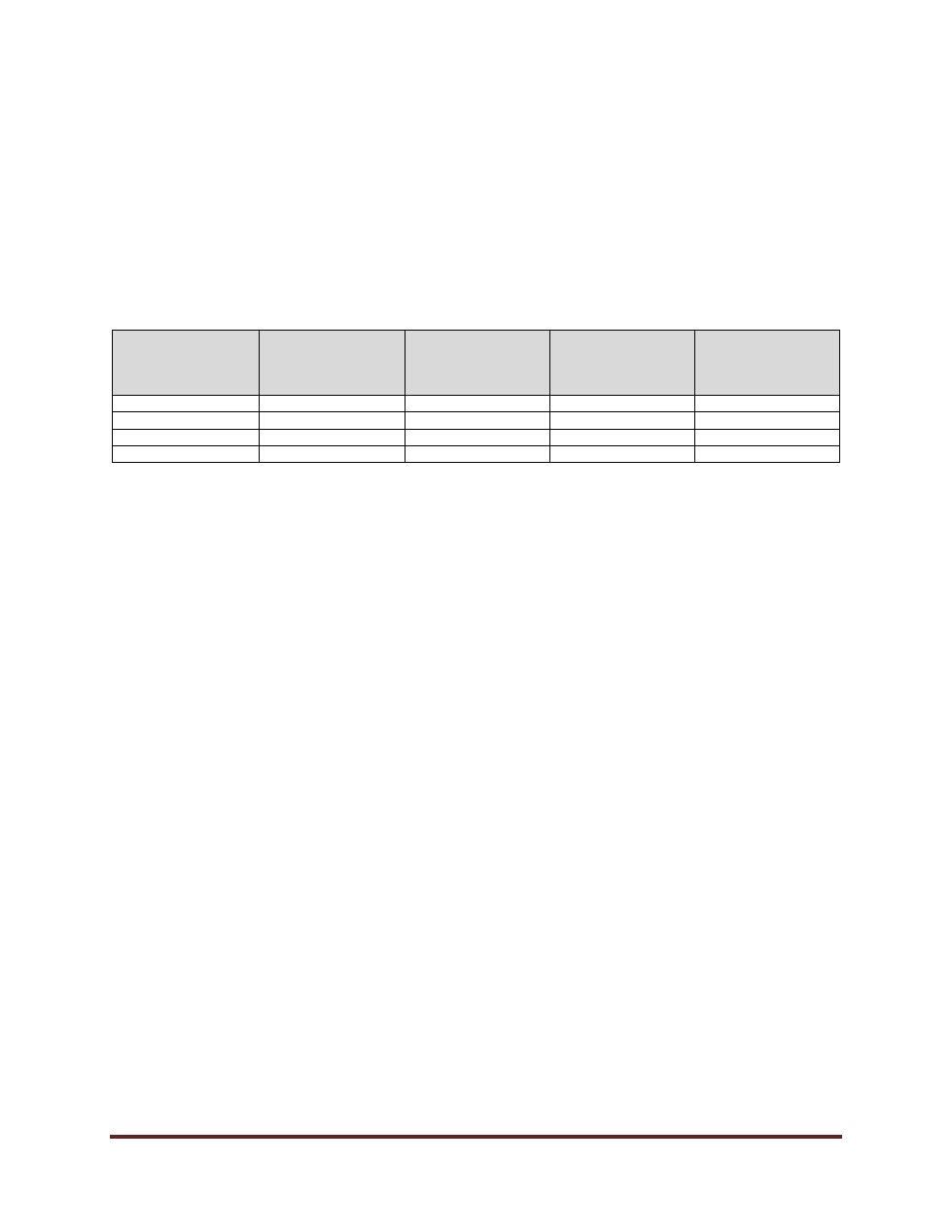
Procedure for the Collection, Storage and Authenticity of Research Data
Page 1 of 5
`
PROCEDURE
FOR
THE
COLLECTION,
STORAGE
AND
AUTHENTICITY
OF
RESEARCH
DATA
Procedure
Type:
Academic
Initially
Approved:
February 17,
2023
Procedure
Sponsor:
Provost and VP
Academic
Last
Revised:
Primary
Contact:
AVP, Office of
Research,
Scholarship and
Community
Engagement
Review
Scheduled:
February 17,
2028
Approver:
General Faculties Council
A.
PROCEDURES
1.
COLLECTION AND AUTHENTICITY
1.1.
Researchers shall use scholarly and scientific rigour in the collection, recording,
and analysis of Research Data, and in the reporting of results.
1.2
Researchers shall be responsible for both with the Research design and with the
supervision of the Research work, such as Research Data acquisition, recording,
analysis, interpretation and storage.
1.3
Researchers shall retain accurately recorded and retrievable results. Wherever
possible, all primary Research Data shall be recorded in clear, adequate, original,
and chronological form.
1.4
Researchers must inform the Office of Research, Scholarship and Community
Engagement (ORSCE) about the nature and location of Research Data in their
possession.
2.
STORAGE AND RETENTION
2.1
Original Research Data shall be retained by the Researcher in a secure location
(as set out below) for a minimum of five (5) years following the completion of the
project or study or for longer periods as required by funding agencies or funding
oversight agencies.
2.2
Research Data containing personal identifiers shall receive additional security.
Storage of identifiers must be physically separate from the remaining Research
Data whenever possible. Identifiers shall be destroyed at the date recommended
by the Human Research Ethics Board (HREB).

Procedure for the Collection, Storage and Authenticity of Research Data
Page 2 of 5
3.
SECURE LOCATIONS
3.1.
Data should be collected and stored throughout the research project using
software and formats that ensure secure storage, and enable preservation of and
access to the data well beyond the duration of the research project.
3.2.
Research Data that are considered ‘sensitive’ typically contain personal identifiers*
or can be otherwise linked to individuals. The level of security used should match
the sensitivity of the data carried. The HREB may recommend increased security
for sensitive Research Data beyond what is required under this Procedure.
* In this context identifiers include but are not limited to:
1.
Names
2.
Postal address information, other than town or city, province – including
postal code
3.
Telephone and fax numbers
4.
Email addresses
5.
Social insurance numbers
6.
Medical record numbers
7.
Health plan numbers
8.
Account numbers
9.
Certificate/license numbers
10.
Vehicle identifiers and serial numbers, including license plate numbers
11.
Device identifiers and serial numbers
12.
Web URLs
13.
Internet Protocol (IP) numbers
14.
Biometric identifiers
15.
Photographic images that include the face
16.
Any other unique identifying number, characteristic or code
17.
University ID numbers or login
18.
Reserve identifiers
19.
Indian status numbers
And in certain situations:
18.
Date of Birth
19.
Occupation
20.
Ethnicity
21.
Gender
22.
First three digits of postal code
4.
DATA ARCHIVING
4.1
The University is committed to facilitating the advancement and creation of
knowledge by encouraging Researchers to share research findings and Research
Data. Sharing research findings and data is the essence of academic activities and
ensures that both disciplinary and interdisciplinary knowledge and understanding
can be built upon and expanded. As a Canadian publicly funded institution, Mount
Royal is committed to the Tri-Agency Research Data Management Policy.

Procedure for the Collection, Storage and Authenticity of Research Data
Page 3 of 5
4.2
The University shall make available a publicly accessible data archive, managed
by the Library, for the storage of Research Data and shall provide support and
assistance to faculty using the archive to comply with the data archiving provisions
of this Procedure.
4.3
Notwithstanding the exceptions listed herein, where required by the policies of
funding agencies such as Tri-Agency, Researchers shall deposit a copy of their
Research Data with the institutional data archive or otherwise make it publicly
available within two years following the conclusion of the research project that
generated the Research Data. Deposit of Research Data not specifically required
by external agencies shall be optional, but encouraged.
4.4
The depositor maintains intellectual property rights and must be cited by anyone
using data from the archive.
4.5
Exemptions to the requirement of section 4.3 to deposit data in the archive shall
include the following:
a)
The protection of confidentiality is of overriding importance, and no
Research Data shall be posted that contain personal identifiers such as
those described or otherwise stipulated by the University policy on the
Ethics of Research Involving Human Participants or decisions of the
HREB.
b)
The removal of identifiers may make Research Data meaningless or prove
prohibitively expensive. In such cases, the HREB should be consulted for
recommendations in such instances.
c)
Consulting or contractual agreements with private companies may contain
clauses that limit public release of Research Data. However, the principles
of academic freedom require that confidentiality clauses or similar
agreements do not overly limit the ability of Researchers to publish their
Research.
d)
Given the broad array of Research Data types used in University research,
it is impossible to envision all circumstances. Further requests for
exemptions from this provision may be made by application to the AVP,
RSCE.
C.
DEFINITIONS
(1)
AVP, RSCE:
the Associate Vice-President, Research, Scholarship and Community
Engagement
(2) Employee:
means individuals who are engaged to work for the University under an
employment contract, including faculty, staff, exempt Employees and
Management Employees
(3) HREB
the University’s Human Research Ethics Board constituted under the Ethics of
Research Involving Human Participants policy
(4) Policy:
refers to the Responsible Conduct in Research policy

Procedure for the Collection, Storage and Authenticity of Research Data
Page 4 of 5
(5) Principle
Investigator:
the Researcher with primary responsibility for a Research project
(6) Procedure
refers to this Procedure for the Collection, Storage and Authenticity of Research
Data
(7) Research:
research is an undertaking intended to extend knowledge through a disciplined
inquiry and/or systematic investigation as defined in the (
Tri-Agency
Framework: Responsible Conduct of Research (2021))
.
Research also includes activities related to one or more of scholarly or artistic
work which occurs through discovery, integration, teaching and learning, or
application of knowledge and is usually disseminated through peer-reviewed
processes.
(8) Research
Data:
in the context of these procedures, "research data" are defined as factual
records (numerical scores, textual records, images and sounds) used as primary
sources for scientific research, and that area commonly accepted in the scientific
community as necessary to validate research findings. A research data set
constitutes a systematic, partial representation of the subject being investigated.
This term does not cover the following: laboratory notebooks, preliminary
analyses, and drafts of scientific papers, plans for future research, peer reviews,
or personal communications with colleagues or physical objects (e.g., laboratory
samples, strains of bacteria and test animals such as mice) (based on the OECD
Principles and Guidelines for Access to Research Data from Public Funding,
2007).
(9) Researcher:
any Employee, Student or individual affiliated with the University (e.g., research
associates, emeriti, adjuncts, visiting scholars, etc.) participating in Research at
or under the auspices of the University
(10)
Student:
means any individual who maintains an affiliation as a learner in the University’s
educational community
(11)
Tri-Agency:
means the Canadian Institutes of Health Research (CIHR), the Natural Sciences
and Engineering Research Council (NSERC) and the Social Sciences and
Humanities Research Council (SSHRC)
(12)
University:
means Mount Royal University
D.
RELATED POLICIES
● Animal Care Policy
● Code of Conduct - Employee
● Code of Student Academic Integrity Policy
● Code of Student Community Standards Policy
● Ethics of Research Involving Human Participants Policy
● Responsible Conduct in Research Policy
E.
RELATED LEGISLATION
● Alberta Freedom of Information and Protection of Privacy Act.
● Canada’s Food and Drugs Act.
● The Canadian Environmental Assessment Act.

Procedure for the Collection, Storage and Authenticity of Research Data
Page 5 of 5
F.
RELATED DOCUMENTS
● Procedure for Addressing Allegations of Misconduct in Research
● Procedure for Conflict of Interest in Research
● Tri-Council Agency Framework: Responsible Conduct of Research (2021)
● Tri-Council Policy Statement: Ethical Conduct for Research Involving Humans (2018)
● Tri-Agency Research Data Management Policy
G.
REVISION HISTORY
Date
(mm/dd/yyyy)
Description of
Change
Sections
Person who
Entered Revision
(Position Title)
Person who
Authorized
Revision
(Position Title)




